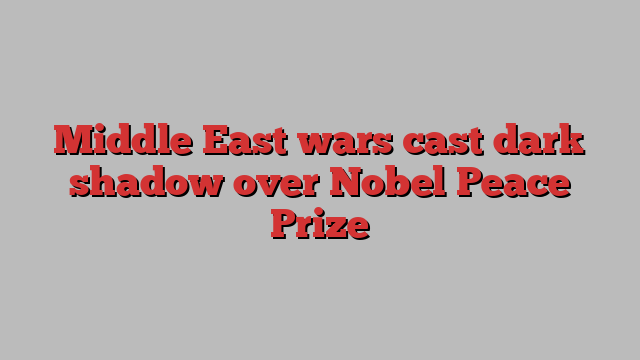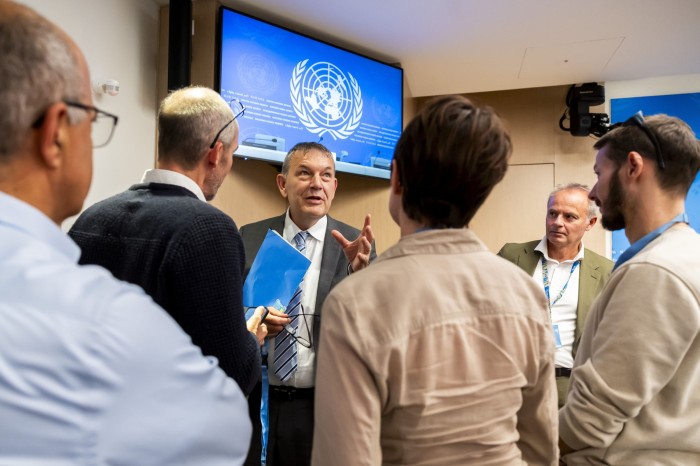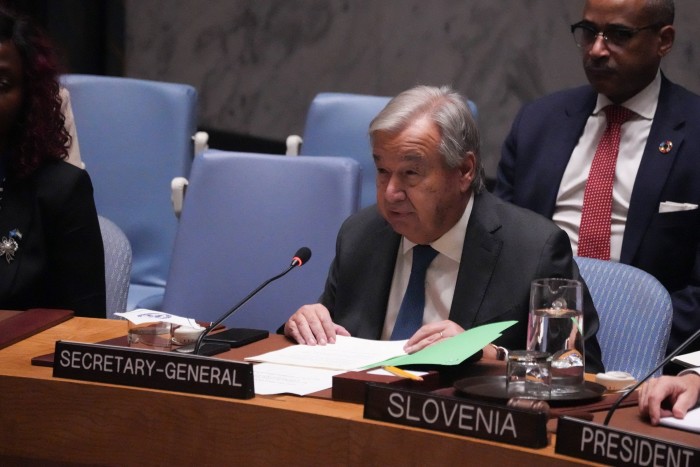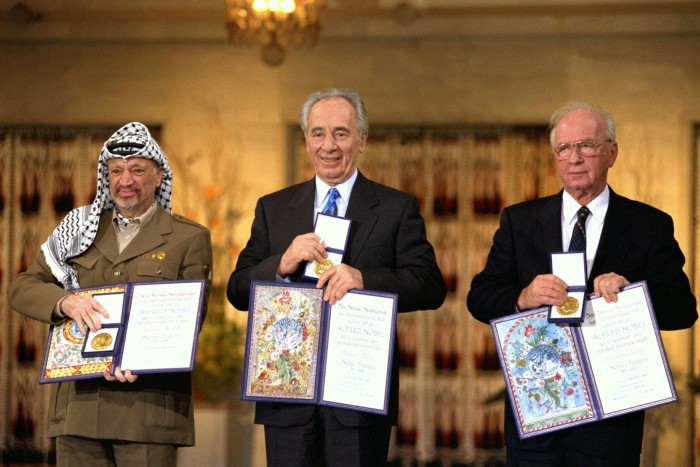
Thirty years after the Nobel Peace Prize was handed to three key figures behind the subsequently failed Oslo peace accords, the raging Middle East conflict looms over the 2024 award, whose nominees include UN bodies caught up in the war.
Experts have suggested that leading contenders for Friday’s award include UNRWA — the UN agency for Palestinian refugees — and the International Court of Justice, another body that has found itself at odds with the Israeli government since Hamas’s attack triggered the war in Gaza a year ago.
The persistence of conflict means the Middle East has accounted for a disproportionate share of peacemaking efforts, and thus has been the focus of several of the peace prizes awarded in recent years.
But nowhere else is the legacy of the prize more open to question, with little evidence that the peacemaking recognised by the committee has borne fruit.
Nominations for the 2024 prize, put forward by an extensive list of people eligible to submit names, include such outliers as tech billionaire Elon Musk and WikiLeaks founder Julian Assange.
But Henrik Urdal, director of the Peace Research Institute Oslo — which consults with the Nobel Prize committee and issues a list of five top picks each year — said UNRWA was one of the likelier winners.
UNRWA was “doing extremely important work for civilian Palestinians that experience the sufferings of the war in Gaza”, said Urdal.

Israel has been highly critical of UNRWA, which in August fired nine staff who it said might have been involved in Hamas’s October 7, 2023 attack on Israel. The militant group killed some 1,200 people in that attack and took 250 hostages, according to Israeli authorities.
Several Western donors suspended aid in the wake of claims by Israel that UNRWA’s employees had been involved. The UN agency, which employs about 13,000 people in Gaza, has condemned Hamas’s assault. Some 220 of its staff have been killed in Israel’s offensive in Gaza, and more than two-thirds of its buildings hit by air strikes.
Urdal emphasised that awarding the prize to UNRWA would be “in no way meant as any sort of political support for Hamas”.
UNRWA — which runs schools, hospitals and other basic services for Palestinians around the region — has also faced criticism from some Israeli politicians who argue that its mandate to care for Palestinian refugees from the 1948 war that created Israel has perpetuated, rather than helped resolve, the protracted Arab-Israeli conflict.
The International Court of Justice, which in January ordered Israel to take action to prevent acts of genocide in the Gaza Strip, is another body listed by the institute as a potential winner.
The interim order was made in a case in which South Africa, joined by other governments, has alleged that Israel is committing genocide in the enclave, where almost 42,000 people have been killed since the war began, according to Palestinian authorities.
Asle Sveen, a historian of the peace prize, told journalists in Oslo that it could also be awarded to UN secretary-general António Guterres, who was last week banned from entering Israel, which said he had not been strong enough in condemning Iran’s ballistic missile attack on its soil.

Dahlia Scheindlin, a Tel Aviv-based public opinion expert at the Century Foundation, said the Israeli public would see the choices of UNRWA or the ICJ as “more evidence that the entire world hates Israel”.
“That’s what I think the reaction would be,” she said. “‘They are choosing a side in this conflict, they are not supporting peace, they are supporting Palestinians.’ I think that’s how a lot of Israelis would see it.”
Diana Buttu, a Palestinian lawyer, said the nominations of UNRWA, ICJ and Guterres were an effort to shore up an international order that she argued Israel had sought to undermine.
“It’s an attempt to save these institutions and individuals from attack by Israel,” she said. “If they really wanted to recognise Palestinians, they would do so directly.”
Israel’s government and much of its population sees the UN as biased against it, along with Norway, which in May recognised a Palestinian state, together with Spain and Ireland.
Over the past two decades, a quarter of the prizes have been awarded to people from the Middle East or made reference to the region. Last year Narges Mohammadi, the imprisoned Iranian rights activist, won the award.
“The Middle East is obviously an area where there has been significant conflict and many authoritarian states,” said Urdal of the Oslo Peace Institute, adding that conflict resolution and human rights are important aspects of the prize.

Some of the prizes age well: after the Camp David Accords between their two countries, Israeli prime minister Menachem Begin and Egyptian president Anwar Sadat shared the 1978 prize, which heralded decades of peace between them.
Other prizes have been less far-sighted: the 1994 prize was controversially awarded to Yasser Arafat, then head of the Palestine Liberation Organization, along with Yitzhak Rabin, then Israeli prime minister, and his foreign minister Shimon Peres after they signed the Oslo Accords. Under that agreement Israel and the PLO agreed to recognise each other, to create the Palestinian Authority and to work towards a lasting peace.
The decision led one judge to resign over Arafat’s inclusion in the prize, while other judges have since expressed their regret at the award. The agreement has since all but disintegrated.
Friday’s prize comes as the Middle East is perilously close to all-out regional war, as Israel has intensified its offensive against Hizbollah in Lebanon and is expected to respond to the ballistic missile attack by Iran.
Urdal said the prize’s recognition of peacemaking efforts could not stretch to bringing about peace.
“It is not a silver bullet. It would be overstating the effect of the prize to suppose that it would be so important that it could force peace upon countries and people,” Urdal said.
Additional reporting by Malaika Kanaaneh Tapper in London